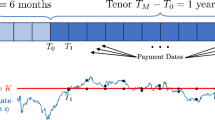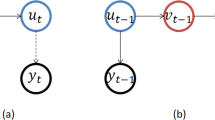Abstract
In this study, we show how S &P 500 Index volatility surfaces can be modeled in a purely data-driven way using variational autoencoders. The approach autonomously learns concepts such as the volatility level, smile, and term structure without leaning on hypotheses from traditional volatility modeling techniques. In addition to introducing notable improvements to an existing variational autoencoder approach for the reconstruction of both complete and incomplete volatility surfaces, we showcase three practical use cases to highlight the relevance of this approach to the financial industry. First, we show how the latent space learned by the variational autoencoder can be used to produce synthetic yet realistic volatility surfaces. Second, we demonstrate how entire sequences of synthetic volatility surfaces can be generated to stress test and analyze an options portfolio. Third and last, we detect anomalous surfaces in our options dataset and pinpoint exactly which subareas are divergent.
Access this chapter
Tax calculation will be finalised at checkout
Purchases are for personal use only
Similar content being viewed by others
References
Abadi, M., et al.: Tensorflow: a system for large-scale machine learning. In: 12th \(\{\)USENIX\(\}\) Symposium on Operating Systems Design and Implementation (\(\{\)OSDI\(\}\) 16), pp. 265–283 (2016)
Ackerer, D., Tagasovska, N., Vatter, T.: Deep smoothing of the implied volatility surface. Tech. rep., arXiv.org (2020)
Bergeron, M., Fung, N., Hull, J., Poulos, Z.: Variational Autoencoders: a hands-off approach to volatility. arXiv.org:2102.03945 (2021)
Chataigner, M., Crépey, S., Dixon, M.: Deep local volatility. Risks 8(3) (2020). https://doi.org/10.3390/risks8030082
Chen, T., Guestrin, C.: XGBoost: A scalable tree boosting system. In: Proceedings of the 22nd ACM SIGKDD International Conference on Knowledge Discovery and Data Mining, pp. 785–794. KDD ’16, ACM, New York, NY, USA (2016). https://doi.org/10.1145/2939672.2939785
Davis, J., Devos, L., Reyners, S., Schoutens, W.: Gradient boosting for quantitative finance. J. Comput. Finance 24(4), 1–40 (2021). https://doi.org/10.21314/JCF.2020.403
Dupire, B.: Pricing with a smile. Risk Magazine, pp. 18–20 (1994)
Gatheral, J., Jacquier, A.: Arbitrage-free SVI volatility surfaces. Quant. Finance 14(1), 59–71 (2014). https://doi.org/10.1080/14697688.2013.819986
Heston, S.: A closed-form solution for options with stochastic volatility with applications to bond and currency options. Rev. Finan. Stud. 6, 327–343 (1993)
Kingma, D.P., Welling, M.: Auto-encoding variational bayes (2013). https://doi.org/10.48550/ARXIV.1312.6114
Kullback, S., Leibler, R.A.: On information and sufficiency. Ann. Math. Stat. 22(1), 79–86 (1951). https://doi.org/10.1214/aoms/1177729694
Lucas, J., Tucker, G., Grosse, R.B., Norouzi, M.: Don’t blame the ELBO! a linear VAE perspective on posterior collapse. In: NeurIPS (2019)
Madan, D., Carr, P., Stanley, M., Chang, E.: The variance gamma process and option pricing. Rev. Finance 2 (1999). https://doi.org/10.1023/A:1009703431535
Nielsen, D., Jaini, P., Hoogeboom, E., Winther, O., Welling, M.: Survae flows: surjections to bridge the gap between VAEs and flows. In: NeurIPS (2020)
Rezende, D.J., Mohamed, S.: Variational inference with normalizing flows. In: Proceedings of the 32nd International Conference on International Conference on Machine Learning - Volume 37, pp. 1530–1538. ICML’15, JMLR.org (2015)
Sohn, K., Lee, H., Yan, X.: Learning structured output representation using deep conditional generative models. In: NIPS (2015)
Wales, D., Doye, J.: Global optimization by basin-hopping and the lowest energy structures of lennard-jones clusters containing up to 110 atoms. The Journal of Physical Chemistry A 101 (1998). https://doi.org/10.1021/jp970984n
Zhu, C., Byrd, R.H., Lu, P., Nocedal, J.: Algorithm 778: L-BFGS-B: fortran subroutines for large-scale bound-constrained optimization. ACM Trans. Math. Softw. 23(4), 550–560 (1997). https://doi.org/10.1145/279232.279236
Author information
Authors and Affiliations
Corresponding author
Editor information
Editors and Affiliations
Rights and permissions
Copyright information
© 2023 The Author(s), under exclusive license to Springer Nature Switzerland AG
About this paper
Cite this paper
Dierckx, T., Davis, J., Schoutens, W. (2023). Towards Data-Driven Volatility Modeling with Variational Autoencoders. In: Koprinska, I., et al. Machine Learning and Principles and Practice of Knowledge Discovery in Databases. ECML PKDD 2022. Communications in Computer and Information Science, vol 1753. Springer, Cham. https://doi.org/10.1007/978-3-031-23633-4_8
Download citation
DOI: https://doi.org/10.1007/978-3-031-23633-4_8
Published:
Publisher Name: Springer, Cham
Print ISBN: 978-3-031-23632-7
Online ISBN: 978-3-031-23633-4
eBook Packages: Computer ScienceComputer Science (R0)




